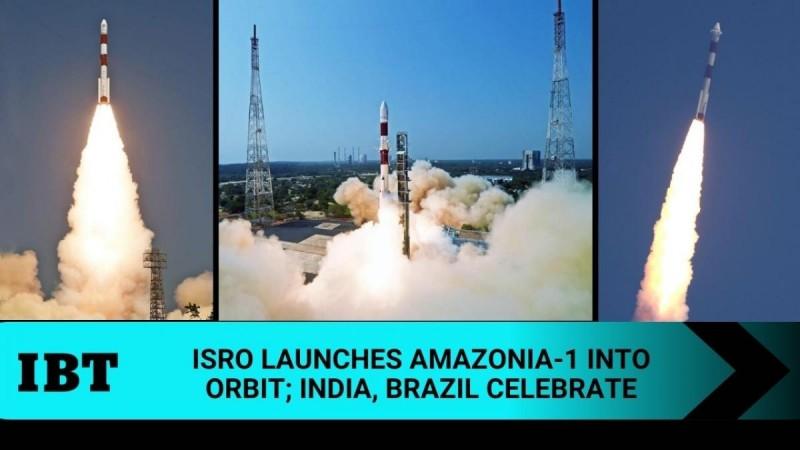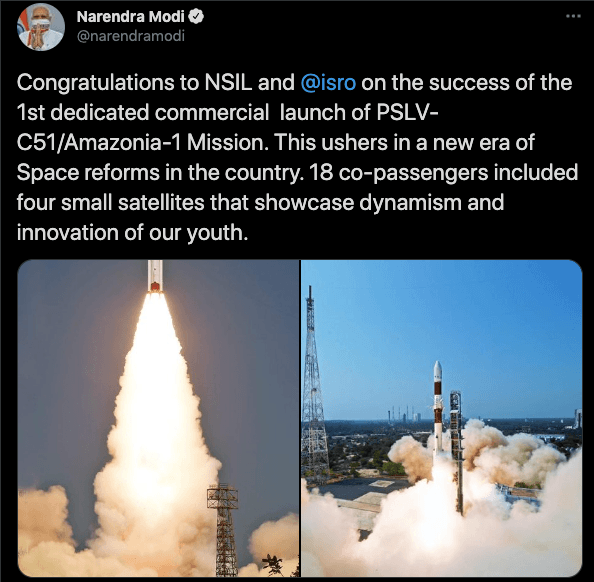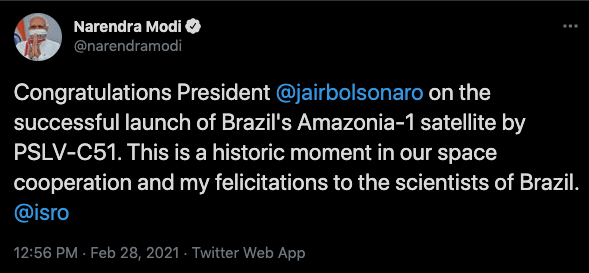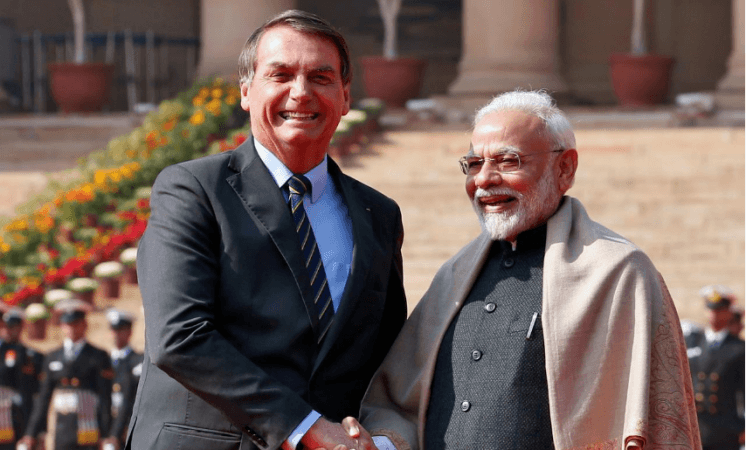On the day India celebrates National Science Day, another historic moment was recorded for the country. The Indian Space Research Organisation (ISRO) on Sunday successfully placed Amazonia-1 Earth Observer satellite in orbit through PSLV-C51 from the Satish Dhawan Space Centre (SDSC) SHAR, Sriharikota. The launch took place as per schedule at 10:24 a.m.
The 44.4-metre tall PSLV-C51 rocket blasted off from the first launch pad here laden with 19 satellites-foreign and Indian- and slowly rose-up towards the skies with thick orange flame at its tail. The rocket slowly gained speed as it went up while emitting a rolling thunder sound. Seventeen minutes into its flight, the Brazilian satellite Amazonia-1 - the first of the 19 satellites- was placed in its intended Sun Synchronous Orbit.

Amazonia-1 is the optical earth observation satellite of the National Institute for Space Research (INPE). According to ISRO, this satellite would further strengthen the existing structure by providing remote sensing data to users for monitoring deforestation in the Amazon region and analysis of diversified agriculture across the Brazilian territory.
Reacting to this historic moment, Indian Prime Minister Narendra Modi congratulated Brazilian President Jair Bolsonaro on the successful launch of the satellite.
"Congratulations President Jair Bolsonaro on the successful launch of Brazil's Amazonia-1 satellite by PSLV-C51. This is a historic moment in our space cooperation and my felicitations to the scientists of Brazil," PM Modi wrote on Twitter.


Meanwhile, the elated Bolsonaro shared the update about Amazonia-1's launch on Twitter.
- Hoje, às 23:50, diretamente da Índia, lançaremos o Amazônia-1, o primeiro satélite 100% brasileiro. Servirá para monitorar nossa Amazônia. O ?? cada vez mais investindo em ciência e a tecnologia.
— Jair M. Bolsonaro (@jairbolsonaro) February 27, 2021
- Lançamento ao vivo pelo link: https://t.co/GbZdZlZTgA
- @mctic @Astro_Pontes pic.twitter.com/TvkiV6LrRM
The Indian ambassador to Brazil Suresh Reddy also congratulated the ISRO team, and Marcos Pontes, the Minister of Science & Technology and Innovation of Brazil, on the successful launch. The Ministry of External Affairs, Government of India, also shared a detailed note highlighting the fruitful partnership between India and Brazil and the emphasis on the space sector.
Message from Ambassador Suresh Reddy on the launch of the #PSLVC51/#Amazonia1 satellite from Satish Dhawan Space Centre (SDSC) SHAR, Sriharikota today ?????@AmbSKReddy @Astro_Pontes @inpe_mct @mctic @espacial_aeb @MEAIndia @isro pic.twitter.com/SGxU9ct26L
— India In Brazil (@indiainbrazil) February 28, 2021
"Amazonia-1 mission will strengthen the existing structure by providing remote sensing data to users for monitoring deforestation in the Amazon region and analysis of diversified agriculture across the Brazilian territory. The launch will be a boost to the Space reforms under Atmanirbhar Bharat initiative by the Indian government. The co-passenger satellites include SDSAT nanosatellite built by Space Kidz India and UNITYsat (combination of 3 satellites) jointly built by Indian academic institutions," the Ministry of External Affairs said in a statement.

India-Brazil relations
India and Brazil are strategic partners and share multilateral fora such as the UN, IBSA, BRICS, BASIC and G-20 among others. The space sector is identified as a major area of collaboration for both countries as a Memorandum of Understanding was signed between the Department of Space, India and the Brazilian Space Agency (AEB) in March 2002 and a Framework Agreement in 2004.

India and Brazil have also collaborated on data sharing and satellite tracking of Indian satellites on a semi-commercial basis. Brazilian earth stations of Alcantara and Cuiaba are being used by ISRO to receive and process data of Indian Remote Sensing satellites. Additionally, both countries are also working closely under the BRICS framework, which is currently discussing a proposal for 'BRICS Virtual Constellation of Remote Sensing Satellites' that will establish a mechanism to share remote sensing satellite data.





!['Lip lock, pressure, pyaar': Vidya Balan- Pratik Gandhi shine in non-judgmental infidelity romcom Do Aur Do Pyaar [ Review]](https://data1.ibtimes.co.in/en/full/797104/lip-lock-pressure-pyaar-vidya-balan-pratik-gandhi-shine-non-judgmental-infidelity-romcom.jpg?w=220&h=138)







